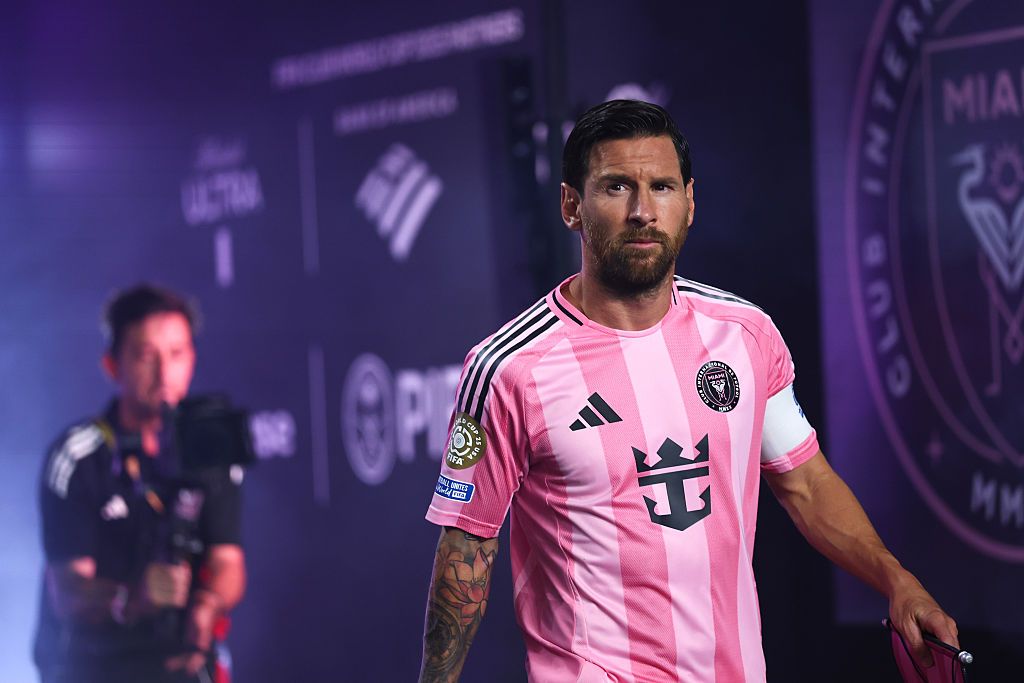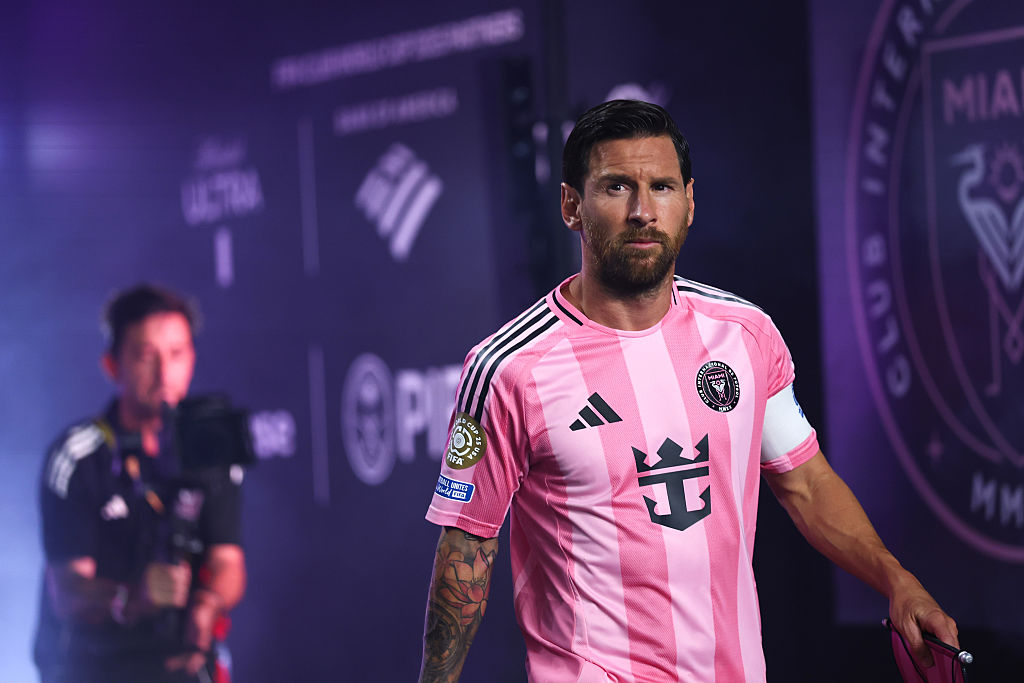

Lionel Messi has signed a three-year contract extension with Inter Miami, extending his stay in Major League Soccer until the end of 2028, when he will be 41 years old.
But even as the league celebrates keeping its biggest star, his silence off the field continues to raise questions about how visible MLSs most valuable asset truly is in a crowded US sports landscape.
Searching for Leo: MLS' approach to media is more lax than the 'big four' US sports and it's denying fans more Messi
Off the field, however, the Argentine's trademark low-profile approach has persisted questions where is he? He has not spoken to US media outside MLS broadcast partner Apple in more than two years, though a forthcoming interview with NBC seemingly part of a new bundle deal with Apple has been announced for later this month.
It all creates a curious contradiction: arguably the greatest of all time plays every week in the United States yet remains largely absent from its mainstream sports conversation.

That paradox undermines a fundamental piece of sports culture in the United States: accessibility. From LeBron James to Tom Brady, the greatest athletes in the US are expected contractually and culturally to face questions, explain performances, and drive forward their leagues public narrative.
In that aspect, Messi to date has offered little. He appears. He dazzles. He disappears.
"I feel like Major League Soccer isnt benefitting as much as they could from having Messi in the league if Messi is not out there engaging with fans and media," former U.S. international and current ESPN analyst Herculez Gomez told FourFourTwo.
"For as big as Messi is, he is in a vacuum, and that vacuum is chosen by him specifically."
That perspective takes on new weight now that Messi, ranked at no.1 in FourFourTwo's list of the greatest players of all time, future in Miami is secured, especially since that vacuum has been hard to miss.
Inter Miami stopped opening its locker room to media a long-standing cultural tradition across US sports the moment the World Cup winner arrived in South Florida.
The following season, Messi did not take part in MLSs customary end-of-year press conference after being voted the leagues Most Valuable Player (an honor he is widely expected to earn again this campaign).
All the while, his multiple injuries have been shrouded in secrecy.
The lack of both accessibility and transparency is emblematic of a wider issue (more on that later), and goes against what might have been the initial expectations for Messi's stateside journey.
It might have been reasonable to expect that his global stature would drive unprecedented media interest, but MLS continues to fight for space in a landscape dominated by the NFL, NBA, MLB, NHL, college sports, and more.
The quality of the product in those leagues is an important ingredient to their success, but so too is the constant storytelling built in part through a steady stream of quotes, personalities, and moments that keep fans and media engaged.

MLS, by contrast, lags in that regard. The league's restrictive approach, along with Messis near-total silence, has led to continued indifference from traditional outlets, especially in the Miami market.
Only one of the regions three major English-language newspapers has a dedicated beat reporter covering the team, and English local television stations rarely send crews to practices or games. Instead, those resources are focused on covering the NFL's Miami Dolphins, the NBA's Miami Heat, the NHL's Florida Panthers, and the other more media-friendly teams.
"There is an emotional connection with the players in those sports," longtime South Florida talk show host Orlando 'Big O' Alzugaray told FourFourTwo. "We get to live and see their victories and defeats, and that allows us to connect with people and see the human side.
"When it comes to Inter Miami, it is just Messi and a bunch of stars that are hidden away from everybody, and nobody really gets to connect with them."
There is, of course, no denying that the 38-year-old Messi is a human highlight reel that does plenty of talking with his feet, churning out goals, assists, and other jaw-dropping moments that almost instantly go viral worldwide.
Still, his sensational skill set, combined with the presence of other stars like Luis Suarez, Jordi Alba, Sergio Busquets, and Rodrigo De Paul, has not been enough to help Inter Miami consistently sell out the modest Chase Stadium (21,550 seats) during the Messi era. Next year, the team is moving to a bigger venue closer to the heart of Miami.
One could argue that the United States is simply not a proper 'soccer country' yet but that would ignore how star power and storytelling drive fandom and daily discourse. Pro golfer Tiger Woods and tennis star Serena Williams were as big for their respective sports as LeBron is to basketball so why then cant Messi and his glitzy teammates grab even a modicum of that mainstream attention?
A closer look at those aforementioned MLS dynamics might provide more insight.
Whereas other professional sports leagues in the United States mandate regular media access to even their biggest stars, Major League Soccer has opted for a more lenient and lax approach with regard player availability. Some MLS athletes speak a handful of times a year or less, which is permitted given that there is no real punishment for ignoring the press like in England with the Premier League.
Add to that MLSs 10-year broadcasting partnership with Apple which airs most games behind a paywall and you can see why the league remains a mainstream afterthought less than a year from the 2026 World Cup.
MLS denied a request for comment for this story, but those who have been around the league for an extended time believe there is an opportunity for more to be done.
There are probably more people who know about Inter Miami outside the US than in the US, and thats a shame, said Gomez. "There is a casual viewer that you could tap into that you have not tapped into.
"There has got to be more ways of having the casual fan, the casual viewer know that Messi is here, Messi is in your country, Messi is in your backyard."

More access to Messi would surely be widely consumed by fans and media across the globe, whether its hearing him describe his latest golazo, analyze an opponents tactics, or praise an up-and-coming teammates performance.
Messi, however, said during his lone US media press conference in August 2023 that he did not think of himself as an ambassador like Pele or David Beckham before him tasked with helping grow the Beautiful Game in the North American country.
But Messi's MLS chapter was never just about goals and shareable social media moments. He was meant to drive the league forward as much internationally as domestically, helping elevate soccer's standing among the broader American audience.
There is no denying Messi has accomplished that to an extent, and may continue to now that he has extended his stay through 2028. Even so, his silence lingers as the one part of his game that has yet to evolve.
That may be the cost of having the living legend on your team and in your league, but it risks dulling his impact in a country that values access as much as excellence.
With Messi's new deal now signed, MLS has time to address that. Whether Messi cooperates is another story.

